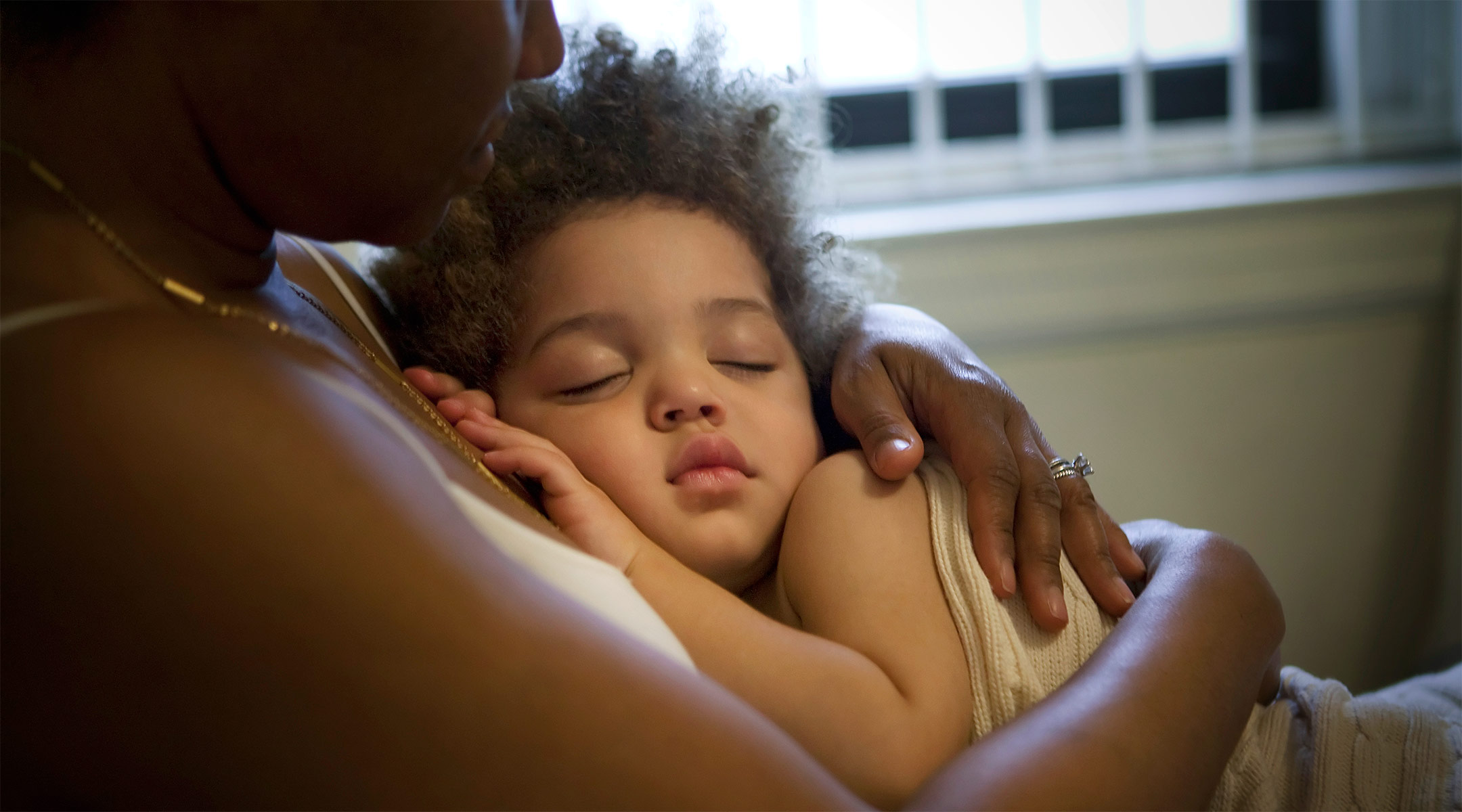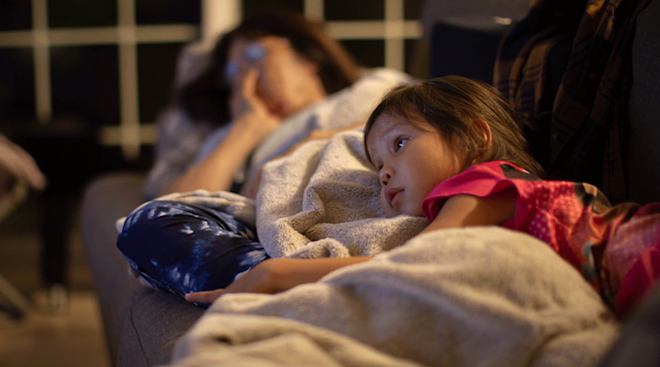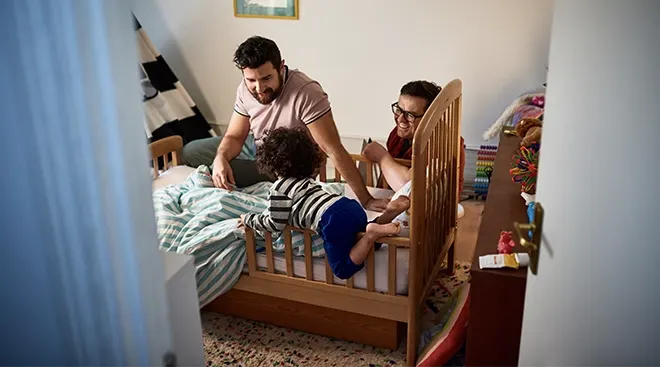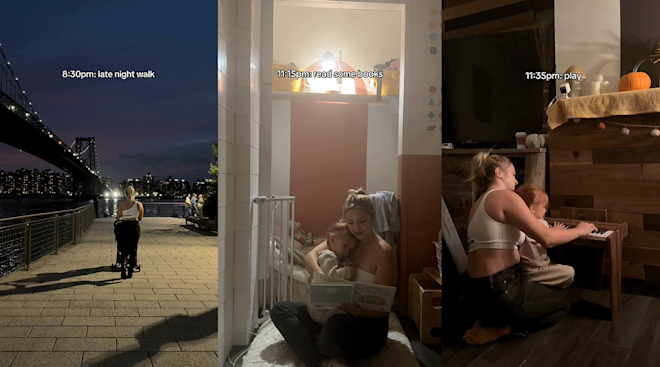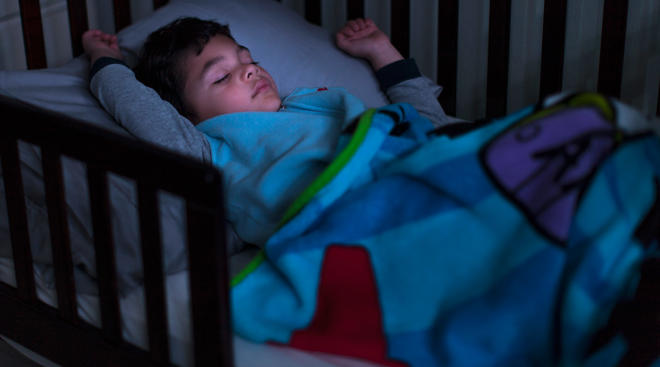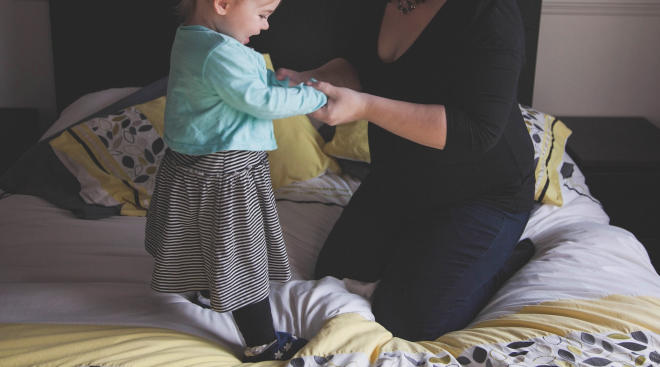Let’s be honest: Your child’s scary dreams are a nightmare for the whole family. If they’re not sleeping, you’re definitely not sleeping—and you may also worry about whether those middle-of-the-night tears are a normal part of childhood or something to be concerned about. Read on for everything you need to know about dealing with—and preventing—nightmares in children.
When baby wakes up crying and upset, it’s natural to wonder whether baby nightmares are to blame–but they’re probably not. It’s possible that tots as young as age 1 have nightmares, but children typically don’t start having dreams—both good and bad—until around 18 months of age, says Martha Pott, PhD, a senior lecturer at the Eliot-Pearson Department of Child Study and Human Development at Tufts University.
Some research indicates that toddler nightmares may not start until even later. “Most studies have shown that nightmares start between ages 2 and 3, but that may just be because this is when children have the language to talk about them,” says Melisa Moore, PhD, a clinical psychologist at the Children’s Hospital of Philadelphia Sleep Center. The bottom line: If baby wakes up crying, it’s highly likely that something else—a grumbling belly or wet diaper—is the cause of their tears.
Experts still aren’t 100 percent sure, but they’ve found an association between stress and nightmares. “Brains are still working while asleep, and dreams and nightmares may be a neurological processing of recent events or the stress associated with recent events,” says Pott. Toddlers, for example, may overhear or see something during the day (an upsetting news clip or scary move an older sibling was watching) that triggers a nightmare come bedtime.
What experts do know about toddler nightmares is that they happen during the Rapid Eye Movement (REM) stage of sleep throughout the second half of the night. And unfortunately for your tot, it’s not always easy to shake the scary dreams. When toddlers wake up from nightmares, they can usually remember parts of the dream and—given their level of language—talk about what happened.
But even though your child may be upset, occasional nightmares in children are nothing to worry about. “Parents should only be concerned about nightmares if scary dreams are very frequent, or if the same dream occurs over and over,” says Pott. “This might indicate a particularly stressful event or time for the child.”
Toddler nightmares vs. night terrors
Unlike nightmares, a night terror is a sleep disorder that can affect children as young as 12 months of age, though they’re most common in children 3 and older. During the episodes, which last anywhere from a few seconds to 45 minutes, kids may scream, cry out, thrash about and even walk around with their eyes open. They may seem awake, but they’re not. In fact, while the night terrors can be incredibly upsetting for parents to witness, children don’t experience them as scary and won’t remember anything about the episode after they wake up.
Something else that distinguishes night terrors from nightmares is the fact that night terrors occur earlier in the night during the deepest stages of sleep. And while nightmares are less likely to happen during naps, children can experience night terrors at naptime.
So what can you do if your toddler is having nightmares? If you wake up to your child’s sobs, go to their side and comfort them—but avoid being overly reassuring or putting too much focus on the nightmare, since that can lead to more anxiety, says Moore. Instead, simply remind them that they’re safe and soothe them back to sleep. If it feels appropriate, you can talk about the nightmare with your child the next day to help them sort through their worries.
The protocol for dealing with night terrors, however, is a bit different. You may want to step in and comfort your child, but experts say you shouldn’t wake toddlers during a night terror, since it can leave them feeling disoriented and interfere with their sleep. “Intervene as little as possible,” says Moore. “More disruptions in sleep can lead to more sleep terrors. It’s best to let a sleep terror run its course.”
Instead, remain calm and stay by your child to make sure they don’t hurt themselves while kicking and flailing about. If they try to get out of bed, gently restrain them (tots who walk around during a night terror are at risk of scary accidents like falling down the stairs). Then, just wait it out. It shouldn’t take too long until your child relaxes and nods back off. Be sure to tell babysitters about the night terrors so they can be prepared to take action when watching your child.
You can’t keep toddler nightmares (or night terrors) at bay completely, but there steps you can take as a parent to help reduce the frequency.
• Make sure your child gets enough sleep. Being overly tired can trigger nightmares in children, so try to keep a consistent sleep schedule.
• Make the bedroom “less scary.” Clear your child’s room of anything that could be upsetting, such as a lamp that casts a creepy shadow on the wall or a puppet that looks just a little too real once the lights go off. You can also give your child a flashlight and do a check for “monsters” under the bed together to show them the room is safe.
• Try co-sleeping with your toddler. “Co-sleeping may prevent or reduce night terrors,” says Pott, who has researched the subject. “We hypothesize that during solitary sleeping, the child senses the absence of a protective adult nearby and reacts with intense fear. Anecdotally, co-sleeping has been shown to eliminate night terrors in a child who was experiencing them nightly.” Note that the AAP doesn’t recommend bed-sharing with babies for safety reasons.
• Look out for signs of stress. “If your child is often anxious during the day, consider asking your pediatrician for a referral for someone that specializes in cognitive behavioral therapy (CBT) for anxiety,” says Moore. “If your child has experienced a traumatic event, nightmares are a frequent symptom and require treatment such as CBT.”
• See an expert. If your child has frequent nightmares, it’s a good idea to see a sleep specialist to rule out other sleep disorders and to help clarify any underlying causes (such as medications that may be causing the nightmares), says Moore. Together, you can get to the bottom of the problem to ensure better nights for everyone in the family.
Published October 2019
Please note: The Bump and the materials and information it contains are not intended to, and do not constitute, medical or other health advice or diagnosis and should not be used as such. You should always consult with a qualified physician or health professional about your specific circumstances.
Plus, more from The Bump:
Navigate forward to interact with the calendar and select a date. Press the question mark key to get the keyboard shortcuts for changing dates.
































